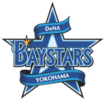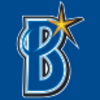Yokohama DeNA BayStars facts for kids
Quick facts for kids Yokohama DeNA BayStars |
|||||
|---|---|---|---|---|---|
| 横浜DeNAベイスターズ | |||||
|
|||||
| Information | |||||
| League | Nippon Professional Baseball
|
||||
| Location | Naka-ku, Yokohama, Kanagawa, Japan | ||||
| Ballpark | Yokohama Stadium | ||||
| Year founded | December 15, 1949 | ||||
| CL pennants | 2 (1960, 1998) | ||||
| Japan Series championships | 3 (1960, 1998, 2024) | ||||
| Former name(s) |
|
||||
| Former ballparks |
|
||||
| Colors | Blue, White |
||||
| Mascot | DB.Starman and DB.Kirara | ||||
| Playoff berths | 6 (2016, 2017, 2019, 2022, 2023, 2024) | ||||
| Ownership | Tomoko Namba | ||||
| Management | DeNA Co., Ltd. | ||||
| Manager | Daisuke Miura | ||||
| Uniforms | |||||
|
|
|||||
The Yokohama DeNA BayStars (横浜DeNAベイスターズ, Yokohama Dī-Enu-Ē Beisutāzu) is a professional baseball team in Japan. They play in the Central League. Their home field is Yokohama Stadium, which is in central Yokohama. The team has had many names since it became professional in 1950. They got their current name in 2011. This happened when a software company called DeNA bought the club.
Contents
- Team History: From Fishing to Baseball Stars
- Early Days: The Taiyo Fishing Team (Before 1950)
- The Taiyo Whales Begin (1950–1952)
- Changes and Mergers: Robins Join the Whales (1953–1954)
- Back to Taiyo Whales and First Championship (1955–1977)
- The Yokohama Taiyo Whales (1978–1992)
- The Yokohama BayStars Era (1993–2011)
- The Yokohama DeNA BayStars Today (2012–Present)
- Season-by-Season Records
- Team Roster
- Team Mascots
- Minor League Team
- See also
Team History: From Fishing to Baseball Stars
Early Days: The Taiyo Fishing Team (Before 1950)
The team started as an amateur group called the Taiyo Fishing Company. This was in the 1930s. They became well-known after winning the National Sports Festival in 1948. Many of their players then joined professional baseball teams. The team's first professional name was the Maruha Team. They were based in Shimonoseki, Yamaguchi.
The Taiyo Whales Begin (1950–1952)
The team's name changed to the Taiyō Whales (大洋ホエールズ, Taiyō Hoeeruzu) in 1950. They got some experienced players from the Yomiuri Giants. However, they usually finished near the bottom of the league. In 1951, there was talk of joining with the Hiroshima Carp team. But people in Hiroshima protested, so the merger did not happen.
Changes and Mergers: Robins Join the Whales (1953–1954)
In 1952, a rule said teams with a very low winning record might have to merge. The Shochiku Robins had a low record. So, they joined with the Taiyo Whales in 1953. The new team was called the Taiyō-Shochiku Robins (大洋松竹ロビンス, Taiyō Shōchiku Robinsu). They played games in Osaka. In 1954, the team became the Yō-Shō Robins (洋松ロビンス, Yō-Shō Robinsu). The Shochiku Robins had actually won a championship in 1950 before this merger.
Back to Taiyo Whales and First Championship (1955–1977)
In 1954, the Shochiku company stopped supporting the team. The name went back to Taiyo Whales. The team moved to Kawasaki, Kanagawa and played at Kawasaki Stadium. For six years, from 1954 to 1959, they finished in last place.
Then, in 1960, a new manager named Osamu Mihara joined. He led the team to their first championship! They won the league and then swept the Daimai Orions in the 1960 Japan Series. This was amazing because they were in last place the year before. A young pitcher, Gentaro Shimada, also threw a no-hitter and perfect game that year. He was the youngest to do so until 2022.
However, this success didn't last long. The team often struggled, even with many star players in the 1970s. Kawasaki Stadium was small, which helped them hit a lot of home runs. But their pitching wasn't strong, and they didn't have much money.
By 1976, the team planned to move to Yokohama. The mayor of Yokohama helped them get financial support.
The Yokohama Taiyo Whales (1978–1992)
In 1978, the team moved to the new Yokohama Stadium. Their name changed to the Yokohama Taiyō Whales (横浜大洋ホエールズ, Yokohama Taiyō Hoeeruzu). This showed their new home city. The team became much more popular. They still didn't win many championships, but they did finish second in 1979.
The Yokohama BayStars Era (1993–2011)
In 1992, the company that owned the team changed its name. They also decided to change the team name to the Yokohama BayStars (横浜ベイスターズ, Yokohama Beisutāzu). The original idea was to call them the Yokohama Whales. But new rules about whaling in Japan made them change their minds. Some fans even thought that dead whales brought bad luck to the team! The BayStars were the first Japanese baseball team not to have their parent company's name in their team name.
The BayStars struggled in the early 1990s. But they slowly built a strong team. In 1998, with manager Hiroshi Gondo, the BayStars won their first league championship in 38 years! They then beat the Seibu Lions to win the Japan Series. The team had great hitting, amazing defense, and strong pitchers. Their offense was so good it was called the "Machine Gun Offense." Players like Bobby Rose, Takuro Ishii, and Takanori Suzuki were part of this powerful hitting group.
After 1998, the team's pitching became weaker. Many star players also left. In 2001, the team was fully bought by TBS. Even with some young stars like Shuichi Murata and Seiichi Uchikawa, the team often finished last.
The Yokohama DeNA BayStars Today (2012–Present)
In 2011, a mobile game company called DeNA bought the team. The name changed to Yokohama DeNA BayStars. They also got a new mascot, Starman.
In 2016, Alex Ramírez, a former BayStars player, became the manager. The team finished third that year. They made it to the final stage of the Climax Series but lost. In 2017, they again finished third. This time, they won the Central League Climax Series! It was their first time winning it in 19 years. They then played in the 2017 Japan Series but lost to the Fukuoka Softbank Hawks in a close series.
In 2023, famous pitcher Trevor Bauer joined the team. In 2024, with new players like Andre Jackson and Anthony Kay, and strong hitters like Shugo Maki and Tyler Austin, the BayStars had a great season. They finished third and made it to the 2024 Central League Climax Series. They swept the Hanshin Tigers and beat the Yomiuri Giants to reach the 2024 Japan Series. In a rematch with the Fukuoka SoftBank Hawks, the BayStars came back from being down 0-2 to win the next four games! This earned them their first Japan Series championship since 1998.
Season-by-Season Records
| Year | Team Name | Place | Manager |
|---|---|---|---|
| 1950 | Taiyo Whales | 5th | Tairiku Watanabe (渡辺大陸) |
| 1951 | Taiyo Whales | 6th | Haruyasu Nakajima (中島治康) Giichi Arima (有馬義一) |
| 1952 | Taiyo Whales | 4th | Tokuro Konishi (小西得郎) |
| 1953 | Taiyo Shochiku Robins | 5th | |
| 1954 | Yosho Robins | 6th | Takeo Nagasawa (永沢武夫) |
| 1955 | Taiyo Whales | 6th | Isamu Fujii (藤井勇) |
| 1956 | Taiyo Whales | 6th | Masami Sakohata (迫畑正巳) |
| 1957 | Taiyo Whales | 6th | |
| 1958 | Taiyo Whales | 6th | |
| 1959 | Taiyo Whales | 6th | Shigeo Mori (森茂雄) |
| 1960 | Taiyo Whales | 1st (Won Japan Series) | Osamu Mihara (三原脩) |
| 1961 | Taiyo Whales | 6th | |
| 1962 | Taiyo Whales | 2nd | |
| 1963 | Taiyo Whales | 5th | |
| 1964 | Taiyo Whales | 2nd | |
| 1965 | Taiyo Whales | 4th | |
| 1966 | Taiyo Whales | 5th | |
| 1967 | Taiyo Whales | 4th | |
| 1968 | Taiyo Whales | 5th | Kaoru Betto (別当薫) |
| 1969 | Taiyo Whales | 3rd | |
| 1970 | Taiyo Whales | 3rd | |
| 1971 | Taiyo Whales | 3rd | |
| 1972 | Taiyo Whales | 5th | |
| 1973 | Taiyo Whales | 5th | |
| 1974 | Taiyo Whales | 5th | |
| 1975 | Taiyo Whales | 5th | Noboru Akiyama (秋山登) |
| 1976 | Taiyo Whales | 6th | |
| 1977 | Taiyo Whales | 6th | Kaoru Betto (別当薫) |
| 1978 | Yokohama Taiyo Whales | 4th | |
| 1979 | Yokohama Taiyo Whales | 2nd | |
| 1980 | Yokohama Taiyo Whales | 4th | Kiyoshi Doi (土井淳) |
| 1981 | Yokohama Taiyo Whales | 6th | |
| 1982 | Yokohama Taiyo Whales | 5th | Junzo Sekine (関根潤三) |
| 1983 | Yokohama Taiyo Whales | 3rd | |
| 1984 | Yokohama Taiyo Whales | 6th | |
| 1985 | Yokohama Taiyo Whales | 4th | Sadao Kondoh (近藤貞雄) |
| 1986 | Yokohama Taiyo Whales | 4th | |
| 1987 | Yokohama Taiyo Whales | 5th | Takeshi Koba (古葉竹識) |
| 1988 | Yokohama Taiyo Whales | 4th | |
| 1989 | Yokohama Taiyo Whales | 6th | |
| 1990 | Yokohama Taiyo Whales | 3rd | Yutaka Sudoh (須藤豊) |
| 1991 | Yokohama Taiyo Whales | 5th | |
| 1992 | Yokohama Taiyo Whales | 5th | Yutaka Sudoh (須藤豊) Akira Ejiri (江尻亮) |
| 1993 | Yokohama Baystars | 5th | Akihito Kondo (近藤昭仁) |
| 1994 | Yokohama Baystars | 6th | |
| 1995 | Yokohama Baystars | 4th | |
| 1996 | Yokohama Baystars | 5th | Akihiko Ohya (大矢明彦) |
| 1997 | Yokohama Baystars | 2nd | |
| 1998 | Yokohama Baystars | 1st (won Japan Series) | Hiroshi Gondoh (権藤博) |
| 1999 | Yokohama Baystars | 3rd | |
| 2000 | Yokohama Baystars | 3rd | |
| 2001 | Yokohama Baystars | 3rd | Masaaki Mori (森祇晶) |
| 2002 | Yokohama Baystars | 6th | |
| 2003 | Yokohama Baystars | 6th | Daisuke Yamashita (山下大輔) |
| 2004 | Yokohama Baystars | 6th | |
| 2005 | Yokohama Baystars | 3rd | Kazuhiko Ushijima (牛島和彦) |
| 2006 | Yokohama Baystars | 6th | |
| 2007 | Yokohama Baystars | 4th | Akihiko Ohya (大矢明彦) |
| 2008 | Yokohama Baystars | 6th | |
| 2009 | Yokohama Baystars | 6th | Akihiko Ohya (大矢明彦) Tomio Tashiro (田代富雄) |
| 2010 | Yokohama Baystars | 6th | Takao Obana (尾花高夫) |
| 2011 | Yokohama Baystars | 6th | |
| 2012 | Yokohama DeNA BayStars | 6th | Kiyoshi Nakahata (中畑清) |
| 2013 | Yokohama DeNA BayStars | 5th | |
| 2014 | Yokohama DeNA BayStars | 5th | |
| 2015 | Yokohama DeNA BayStars | 6th | |
| 2016 | Yokohama DeNA BayStars | 3rd | Alex Ramirez (アレックス・ラミレス) |
| 2017 | Yokohama DeNA BayStars | Climax Series Champions (3rd) | |
| 2018 | Yokohama DeNA BayStars | 4th | |
| 2019 | Yokohama DeNA BayStars | 2nd | |
| 2020 | Yokohama DeNA BayStars | 4th | |
| 2021 | Yokohama DeNA BayStars | 6th | Daisuke Miura (三浦大輔) |
| 2022 | Yokohama DeNA BayStars | 2nd | |
| 2023 | Yokohama DeNA BayStars | 3rd | |
| 2024 | Yokohama DeNA BayStars | 3rd (won Japan Series) |
Team Roster
|
Yokohama DeNA BayStars roster
|
|||||||
|---|---|---|---|---|---|---|---|
| First squad | Second squad | ||||||
|
Pitchers
Catchers
|
Infielders
Outfielders
Manager
Coaches
|
Pitchers
Catchers
|
Infielders
Outfielders
Manager
Coaches
(Patrol)
|
||||
| Development Players | |||||||
|
|||||||
| Updated November 3, 2024 | → All NPB rosters | ||||||
Famous Former Players
Here are some of the well-known players who have played for the team:
 Noboru Akiyama – Pitcher (1956–1967)
Noboru Akiyama – Pitcher (1956–1967) Makoto Matsubara – First Baseman (1962–1980)
Makoto Matsubara – First Baseman (1962–1980) Masaji Hiramatsu – Pitcher (1967–1984)
Masaji Hiramatsu – Pitcher (1967–1984) John Sipin – Second Baseman (1972–1977)
John Sipin – Second Baseman (1972–1977) Daisuke Yamashita – Shortstop, Second Baseman, Third Baseman (1974–1987)
Daisuke Yamashita – Shortstop, Second Baseman, Third Baseman (1974–1987) Tomio Tashiro – Third Baseman, First Baseman, Outfielder (1976–1991)
Tomio Tashiro – Third Baseman, First Baseman, Outfielder (1976–1991) Akio Saito – Pitcher (1977–1993)
Akio Saito – Pitcher (1977–1993) Kazuhiko Endoh – Pitcher (1978–1992)
Kazuhiko Endoh – Pitcher (1978–1992) Yutaka Takagi – Second Baseman, Shortstop (1981–1993)
Yutaka Takagi – Second Baseman, Shortstop (1981–1993) Carlos Ponce – First Baseman (1986–1990)
Carlos Ponce – First Baseman (1986–1990) Jim Paciorek – First Baseman, Left Fielder (1988–1991)
Jim Paciorek – First Baseman, Left Fielder (1988–1991) Motonobu Tanishige – Catcher (1989–2001)
Motonobu Tanishige – Catcher (1989–2001) Takuro Ishii – Shortstop, Third Baseman, Pitcher (1989–2008)
Takuro Ishii – Shortstop, Third Baseman, Pitcher (1989–2008) Kazuhiro Sasaki – Pitcher (1990–1999, 2004–2005)
Kazuhiro Sasaki – Pitcher (1990–1999, 2004–2005) Takanori Suzuki – Outfielder (1991–2008)
Takanori Suzuki – Outfielder (1991–2008) Takashi Saito – Pitcher (1992–2005)
Takashi Saito – Pitcher (1992–2005) Daisuke Miura – Pitcher (1992–2016)
Daisuke Miura – Pitcher (1992–2016) Glenn Braggs – Right Fielder (1993–1996)
Glenn Braggs – Right Fielder (1993–1996) Robert Rose – Second Baseman (1993–2000)
Robert Rose – Second Baseman (1993–2000) Takahiro Saeki – First Baseman, Outfielder (1993–2010)
Takahiro Saeki – First Baseman, Outfielder (1993–2010) Norihiro Komada – First Baseman (1994–2000)
Norihiro Komada – First Baseman (1994–2000) Seiichi Uchikawa – First Baseman, Outfielder (2001–2010)
Seiichi Uchikawa – First Baseman, Outfielder (2001–2010) Shuichi Murata – Third Baseman (2003–2011)
Shuichi Murata – Third Baseman (2003–2011) Tyrone Woods – First Baseman (2003–2004)
Tyrone Woods – First Baseman (2003–2004) Alex Ramírez – Outfielder (2012–2013)
Alex Ramírez – Outfielder (2012–2013) Trevor Bauer – Pitcher (2023)
Trevor Bauer – Pitcher (2023) Neftalí Soto – First Baseman, Third Baseman (2018–2023)
Neftalí Soto – First Baseman, Third Baseman (2018–2023)
Honored Numbers
The team honors these numbers for important players:
Players Who Played in MLB
Some players from the BayStars have also played in Major League Baseball (MLB) in the United States:
- Shota Imanaga (2024–present)
- Yuli Gurriel (2014–2015)
- Tomo Ohka (1999–2009)
- Takashi Saito (2006–2012)
- Kazuhiro Sasaki (2000–2003)
- Kazuo Fukumori (2008)
- Yoshi Tsutsugo (2020–2022)
- Joe Stanka (1966)
- Trevor Bauer (2023)
Team Mascots
The BayStars have fun star-themed mascots!
Here are some of the mascots over the years:
- Hosshey (ホッシ) (1993–2012)
- Hossiena (ホッシーナ) (1993-2012)
- Hossizo (ホッシーゾ) (1993-2012)
- DB.Starman (DB.スターマン) (2012–present)
- DB.Kirara (DB.キララ) (DB Starman's daughter) (2012–present)
- DB.Rider (2012–2017)
Minor League Team
The BayStars also have a minor league team. They play in the Eastern League. This team was started in 1950. The minor league team has the same name and uniforms as the main team. They play most of their home games at Yokosuka Stadium in Yokosuka, Kanagawa.
See also
 In Spanish: Yokohama DeNA BayStars para niños
In Spanish: Yokohama DeNA BayStars para niños
- Tokyo Broadcasting System Holdings, Inc.
- Maruha Nichiro Holdings, Inc.
 | Janet Taylor Pickett |
 | Synthia Saint James |
 | Howardena Pindell |
 | Faith Ringgold |





